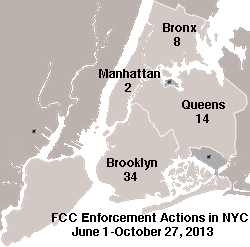It was a pretty busy summer for the federales, who not only managed to roll out their own version of the Enforcement Action Database, but made moves against pirate radio broadcasters in nine states. Among them, New York saw the vast majority of this action.
 Of the 80+ recently-logged enforcement actions (which brings the yearly total to 200), nearly three-quarters of those happened in four of the five boroughs of New York City.
Of the 80+ recently-logged enforcement actions (which brings the yearly total to 200), nearly three-quarters of those happened in four of the five boroughs of New York City.
In the month of July alone, FCC agents visited and sent warning letters to more than two dozen pirates in the city; one unlucky station op in Queens got two visits and warning letters within this time span.
The turnaround time between an FCC visit and a warning letter in New York is now measured within days, not weeks. Should this disproportionality of pirate activity and enforcement continue, NYC will displace the Miami metropolitan area as the all-around U.S. pirate hotspot within a matter of months.
Speaking of Florida, the FCC is notably absent there—just one enforcement action reported over the summer, and that a $15,000 Notice of Apparent Liability to a broadcaster raided and arrested by local cops in June. In that particular case, however, we get a good sense of how the FCC and local authorities work together in states where pirate radio has been criminalized: the FCC visited the pirate three times before bringing in the local cops to do the heavy-handedness. Then, four months later, the FCC adds insult to injury with the proposed fine.
I thought the entire point of Florida (and New York, and New Jersey, and perhaps Massachusetts) criminalizing pirate broadcasting was to free up FCC resources. But there’s no evidence to suggest that things actually work that way.
Interestingly, the FCC’s overall tally of field enforcement activity shows nothing after September 5th. This is long before the government shutdown (which did produce a noticeable uptick in pirate broadcast activity, at least on the shortwave bands), and suggests that either FCC enforcement as a whole simply fell of a cliff come the start of fall, or someone at the agency is slacking when it comes to updating their public information.
If the FCC’s enforcement protocol is evolving to a point where field offices block out certain dates to focus on pirate-busting, we can expect to see a slew of NALs and actual forfeitures flow from the agency before the end of the year. This will certainly look good on paper, but in practice it’s not a winning strategy. My own FM bandscan in Brooklyn finds pirates still on the air on nearly every frequency agents supposedly "cleared" this summer.
Skip to content